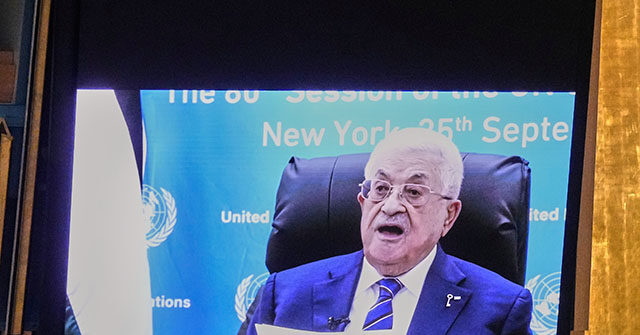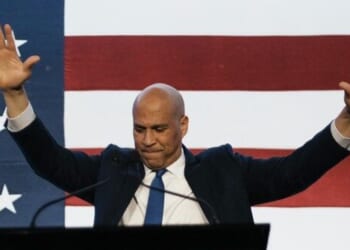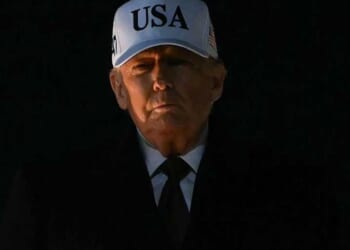Palestinian Authority President Mahmoud Abbas addressed the U.N. General Assembly (UNGA) in New York City on Thursday by video link, since he and the rest of his delegation were denied visas to enter the United States for reasons of national security.
Abbas began by claiming the Palestinian people in the Gaza Strip have been facing “a war of genocide, destruction, starvation, and displacement waged by the Israeli occupation forces.”
Abbas claimed Israel has “killed or injured more than 220,000 Palestinians, the majority of whom are unarmed children, women, and the elderly.” He further accused Israel of displacing “hundreds of thousands” and “preventing the entry of food and medical supplies, which caused the starvation of two million Palestinians.”
“They imposed a stifling siege on an entire people, and destroyed more than eighty percent of homes, schools, hospitals, churches, mosques, facilities, and infrastructure,” he continued.
“What Israel is carrying out is not merely an aggression. It is a war crime, and a crime against humanity,” he said.
“In the West Bank, including in East Jerusalem, the capital of the State of Palestine, the extremist Israeli government continues to implement its settlement policies through illegal settlement expansion,” Abbas said.
There is no “State of Palestine,” but the West Bank is the area generally under the control of the organization Abbas commands, the Palestinian Authority (PA). He strenuously objected to Israeli development plans that would divide the territory under PA control, a move he said would “undermine the option of the two-state solution in a blatant violation of international law and relevant Security Council resolutions, specifically Resolution 2334.”
“Furthermore, the Israeli prime minister announced a plan for what he calls Greater Israel, which we reject and completely deplore,” Abbas said.
Israeli Prime Minister Benjamin Netanyahu gave an interview in August during which the interviewer, a former Israeli lawmaker named Sharon Gal, presented him with an amulet that ostensibly contained “a map of the Promised Land.”
Gal said the map offered a vision of “Greater Israel,” a term that came into use after the Six-Day War in 1967 and referred to the territory Israel conquered while defending itself, including the West Bank and East Jerusalem, plus the Gaza Strip, the Sinai Peninsula, and the Golan Heights.
Gal asked Netanyahu if he felt connected to this vision, and Netanyahu replied, “Very much.”
There has been much debate over the ensuing weeks about exactly what Netanyahu was saying he felt “connected to.” Netanyahu’s critics seized on the Gal interview as proof he intends to conquer all of the West Bank and Gaza, subjugating or expelling the Palestinian residents, and might intend to push even further into neighboring Arab states. Several other speakers at the UNGA made accusations about “Greater Israel” similar to those made by Abbas.
When Abbas finally got around to mentioning the reason for the Gaza war, the Hamas attack on Israeli civilians in October 2023, he said that “despite all that our people have suffered, we reject what Hamas carried out on the 7th of October.”
“These actions did not represent the Palestinian people, nor do they represent their just struggle for freedom and independence,” he said.
“We have affirmed, and we will continue to affirm, that the Gaza Strip is an integral part of the State of Palestine, and that we are ready to bear full responsibility for governance and security there. Hamas will not have a role to play in governance,” he promised.
Abbas said Hamas and other factions would “have to hand over their weapons to the Palestinian National Authority, as part of a process to build the institutions of one state, one law, and one legal security force.”
“I reiterate that we do not want an armed state,” he said.
Abbas complained at length about the suffering of the Palestinians since the 1940s, culminating in their suffering in the Gaza war, which he never got around to blaming on Hamas despite his brief mention of the October 7 atrocities. He complained that “over one thousand” U.N. resolutions have been passed against Israel, but “none have been implemented.”
Abbas exhaustively thanked the European leaders who have unilaterally recognized “the State of Palestine,” which he described as a step toward “ending the occupation and restoring a state of hope to both the Palestinian and Israeli people.” Those recognitions have not specified exactly what the “State of Palestine” is or who represents it.
The PA leader also thanked the protesters around the world who have supported the Palestinian cause, making no mention of the violence and antisemitic oppression spread by many of those protesters, or that quite a few of them explicitly support Hamas.
“We reject confusing solidarity with the Palestinian cause and the issue of antisemitism, which is something that we reject based on our values and principles,” he said.
Abbas demanded full membership for “the State of Palestine” in the United Nations, claiming the PA has met the standards for membership because it “recognized Israel’s right to exist in 1988 and 1993.” He chose not to mention that he was elected to a four-year term as president in 2005 and has not stood for election since, a political methodology the U.N. tends to frown upon when considering new applicants.
Abbas read a list of demands to the United Nations, including the immediate end of Israeli operations, complete withdrawal of Israeli forces, unconditional access for the shipment of goods into Gaza, and for Israel to “stop using starvation as a weapon.”
Abbas also demanded “the release of all hostages and prisoners on both sides,” an end to “the terrorism of settlers and the theft of Palestinian lands and property,” and “stopping the aggression against the status quo in holy sites.”
“These are all unilateral actions that undermine the two-state solution in Gaza,” he said.
Abbas demanded full power over Gaza for his Palestinian Authority, which might be a tough sell for Hamas even if the Israelis were minded to indulge him. He suggested his “Palestinian forces” might have the muscle to take control if they get enough support from the United Nations.
Abbas would also expect to have total control over the enormous sums of money he demanded for “reconstruction,” and he wanted to sweeten that pot by demanding the “release of Palestinian tax money that is being held by Israel unjustly.”
Israel handles tax collection in the West Bank under a 1994 agreement, then transfers the revenue to the Palestinian Authority. The agreement gives Israel the power to deduct compensation for services provided to the West Bank, a power the PA frequently accuses Israel of abusing.
The Israeli government has frozen a great deal of the West Bank’s tax money since the October 7 attack by Hamas. U.S. Ambassador to Israel Mike Huckabee said in early September that the Trump administration’s effort to persuade Israel to release these frozen funds was greatly complicated by the insistence of European powers on unilaterally declaring a Palestinian state.
Abbas said the PA is “ready to work with U.S. President Donald Trump, and with the Kingdom of Saudi Arabia, and friends at the United Nations, and all partners to implement the peace plan that was approved at the conference that was held on the 22nd of September, in a way that would lead toward a just peace and regional cooperation.”
“The time has come for the international community to do right by the Palestinian people, so that they may obtain their legitimate rights to be rid of the occupation, and to not remain a hostage to the temperament of Israeli politics — which denies our rights, and continues in their injustice, oppression, and aggression,” he said.
Abbas concluded by declaring a claim over the Israeli capital.
“Palestine is ours,” he insisted. “Jerusalem is the jewel of our heart, and our eternal capital. We will not leave our homeland. We will not leave our lands. Our people will remain rooted like the olive trees, firm as the rocks.”


















